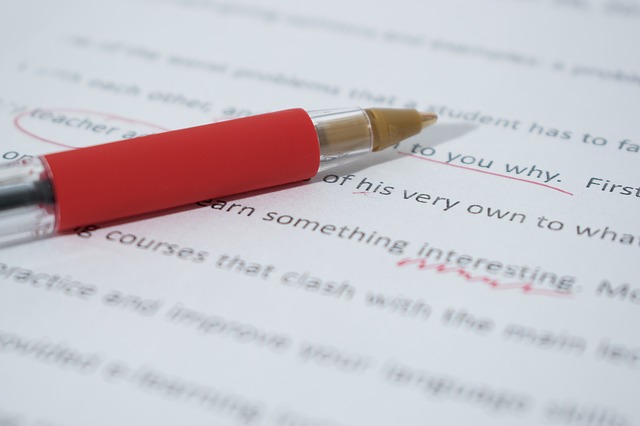by Hallee Bridgeman, @halleeb
As an author, it is my responsibility to hand my editors the cleanest copy I can hand them. This is so that they don’t get bogged down by a bunch of mistakes and weak writing that I could have corrected myself, and can focus on other issues that need editing.
After running a spelling and grammar check (my first step), the next thing I do is try to clean up as much of the passive verbs as I possibly can.
It’s important in fiction writing to write actively – because doing so makes it much more interesting for the reader. However, when American English is our first language, we naturally speak passively. So, for me anyway, I tend to write passively. I’ve tried to edit as I go and stop myself from using passive sentences, but it completely destroys the flow of my writing, so I’ve given up and just now search for passive sentences when it’s time for my self-editing.
I do a search for each of these passive verbs:
- Is
- Are
- Was
- Were
- Be
- Being
- Been
Here is an example of passive versus active:
ACTIVE VOICE: YOU STOLE THE COOKIE FROM THE COOKIE JAR.
PASSIVE VOICE: THE COOKIE WAS STOLEN FROM THE COOKIE JAR.
Searching for passive verbs in a 100,000 word document is a daunting task, made more difficult by the fact that not every passive verb is in a passive sentence. For instance:
Her eyes were blue.
That sentence is a state of being. Her eyes were blue. There’s no way to make that active.
There are ways to make it more interesting.
Example: “Her blue eyes sparkled like the most precious sapphires.”
Her hair was brown.
It was just after 3 o’clock.
In the above examples, her hair is in a STATE OF BEING the color brown. The time was in a STATE OF BEING just past 3. It could be awkward or unclear to imbue either of the above sentences with action and they need not be revised. However, revision with an eye toward emotive action that also fits the narrative flow will improve the literary quality of the work.
Examples: Her lustrous brown hair distracted him. He barely noticed the passage of time until a glance at his watch revealed the hour had crept past three.
That said, when I’m editing, I only change the passive verbs in the narrative. Since we normally and naturally speak passively, then it stands to reason that it’s normal and natural for my characters to speak passively. Most of the time, I leave the passive sentences in the dialogue alone. Sometimes, as I’m analyzing passive versus active, I realize a much better way to say what I’m saying, even when it’s dialogue, and change it. But most of the time it stays. It sounds right with speaking, and doesn’t hurt the storytelling.
 Two Olympians are matched in a media campaign that turns into something more than a game.
Two Olympians are matched in a media campaign that turns into something more than a game.
Rio Games silver medalist and social media darling CORA “JADE” ANDERSON is approached by a popular cell phone company to launch a flirty but fake media campaign with ice hockey star DAVIS ELLIOTT. When things get off to a rocky start, Cora and Davis both wonder what they’ve gotten into and how they’ll get through the months until the Korean games.
It’s not long until things start to warm up between the athletes and soon this fake romance becomes something much more real. Cora knows just how to work social media and engage her fans, and as the world watches and interacts with them, their love grows. When Davis is selected for Team USA, the opposition starts. As a Korean American, he’s already facing odds Cora can never comprehend, but he takes his frustration at the racism to the ice and lets the puck take the beating.
Things come to a head just weeks before the games begin. Can Davis and Cora’s very public relationship survive the aftermath of a very public confrontation, or are they going to have to let their love go when the Olympic flame is extinguished at the closing ceremonies?

With more than half a million book sales, Hallee Bridgeman is a best-selling Christian author who writes action-packed romantic suspense focusing on realistic characters who face real world problems. Her work has been described as everything from refreshing to heart-stopping exciting and edgy.
An Army brat turned Floridian, Hallee finally settled in central Kentucky with her family so that she could enjoy the beautiful changing of the seasons. She enjoys the roller-coaster ride thrills that life with a National Guard husband, a college sophomore daughter, and two elementary aged sons delivers.
A prolific writer, when she’s not penning novels, you will find her in the kitchen, which she considers the ‘heart of the home’. Her passion for cooking spurred her to launch a whole food, real food “Parody” cookbook series. In addition to nutritious, Biblically grounded recipes, readers will find that each cookbook also confronts some controversial aspect of secular pop culture.
Hallee is a member of the Published Author Network (PAN) of the Romance Writers of America (RWA) where she serves as a long time board member in the Faith, Hope, & Love chapter. She is a member of the American Christian Fiction Writers (ACFW) and the American Christian Writers (ACW) as well as being a member of Novelists, Inc. (NINC).
Hallee loves coffee, campy action movies, and regular date nights with her husband. Above all else, she loves God with all of her heart, soul, mind, and strength; has been redeemed by the blood of Christ; and relies on the presence of the Holy Spirit to guide her. She prays her work here on earth is a blessing to you and would love to hear from you. You find Hallee on her blog at halleebridgeman.com

